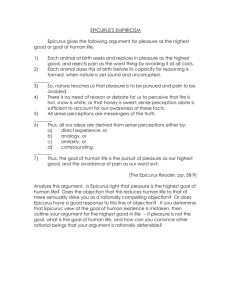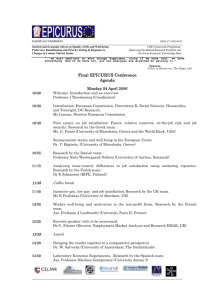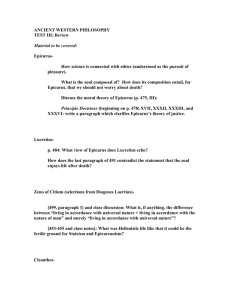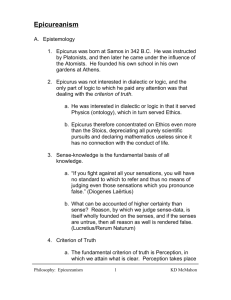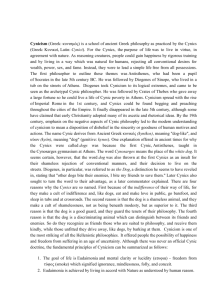Ethical teachings of Epicurus based on human nature in the light of
advertisement
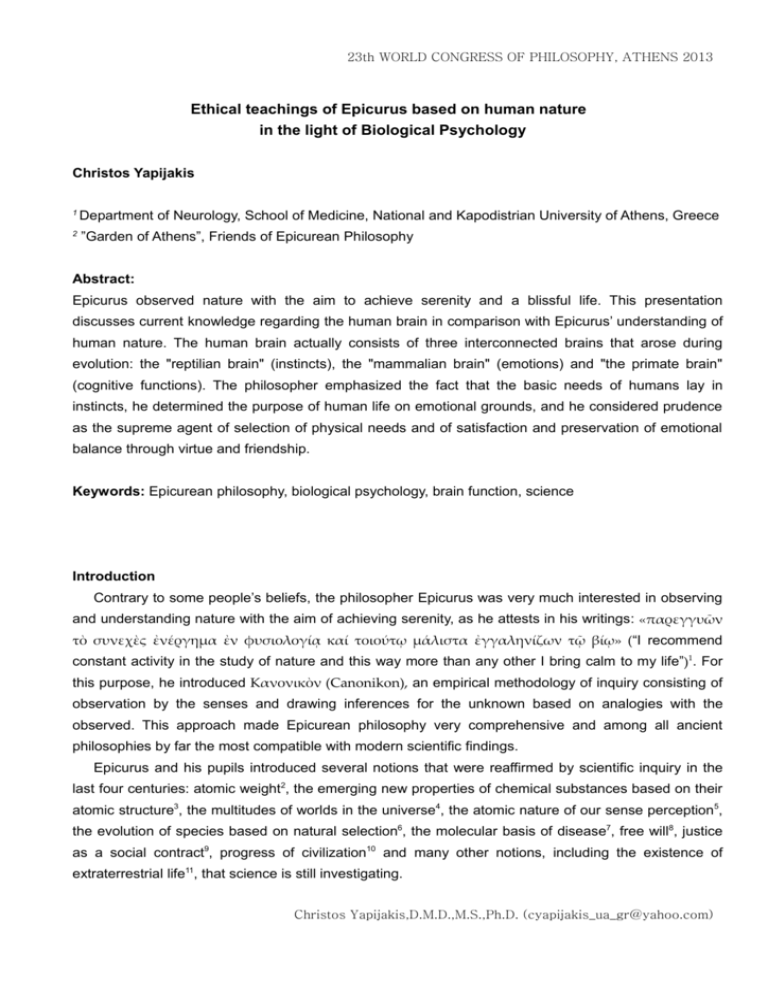
23th WORLD CONGRESS OF PHILOSOPHY, ATHENS 2013 Ethical teachings of Epicurus based on human nature in the light of Biological Psychology Christos Yapijakis 1 Department of Neurology, School of Medicine, National and Kapodistrian University of Athens, Greece 2 ”Garden of Athens”, Friends of Epicurean Philosophy Abstract: Epicurus observed nature with the aim to achieve serenity and a blissful life. This presentation discusses current knowledge regarding the human brain in comparison with Epicurus’ understanding of human nature. The human brain actually consists of three interconnected brains that arose during evolution: the "reptilian brain" (instincts), the "mammalian brain" (emotions) and "the primate brain" (cognitive functions). The philosopher emphasized the fact that the basic needs of humans lay in instincts, he determined the purpose of human life on emotional grounds, and he considered prudence as the supreme agent of selection of physical needs and of satisfaction and preservation of emotional balance through virtue and friendship. Keywords: Epicurean philosophy, biological psychology, brain function, science Introduction Contrary to some people’s beliefs, the philosopher Epicurus was very much interested in observing and understanding nature with the aim of achieving serenity, as he attests in his writings: «παρεγγυῶν τὸ συνεχὲς ἐνέργημα ἐν φυσιολογίᾳ καί τοιούτῳ μάλιστα ἐγγαληνίζων τῷ βίῳ» (“I recommend constant activity in the study of nature and this way more than any other I bring calm to my life”)1. For this purpose, he introduced Κανονικὸν (Canonikon), an empirical methodology of inquiry consisting of observation by the senses and drawing inferences for the unknown based on analogies with the observed. This approach made Epicurean philosophy very comprehensive and among all ancient philosophies by far the most compatible with modern scientific findings. Epicurus and his pupils introduced several notions that were reaffirmed by scientific inquiry in the last four centuries: atomic weight2, the emerging new properties of chemical substances based on their atomic structure3, the multitudes of worlds in the universe4, the atomic nature of our sense perception5, the evolution of species based on natural selection6, the molecular basis of disease7, free will8, justice as a social contract9, progress of civilization10 and many other notions, including the existence of extraterrestrial life11, that science is still investigating. Christos Yapijakis,D.M.D.,M.S.,Ph.D. (cyapijakis_ua_gr@yahoo.com) 23th WORLD CONGRESS OF PHILOSOPHY, ATHENS 2013 In the last fifty years scientific research has confirmed the Epicurean view of the molecular basis of life and disease. This presentation will discuss the current knowledge regarding the human brain and compare it with Epicurus’ understanding of human nature. Evolutionary origins of the human brain The human brain, which regulates all mental, emotional, sensory and motor functions, is the product of a long process of evolution that has been unravelled for millions of years. All living organisms on Earth originate from a common ancestor and all current biological structures derive from alteration or improvement of ancestral biological structures. Thus, the human brain actually consists of three different interconnected brains that arose during evolution: a) the "reptilian brain" which appeared about 300 million years ago, b) the "mammalian brain" which appeared about 100 million years ago and c) the "brain of primates" (a group of higher mammals that includes apes and humans), which appeared about 35 million years ago. The primitive "reptilian brain", which corresponds mainly to the hypothalamus, controls the instincts of survival, hunger, thirst, sexual drive, etc. The "mammalian brain", which corresponds mainly to the amygdala and hippocampus, controls emotions of pleasure, fear, love, anger, hate, etc. Finally, the "primate brain", which corresponds mainly to the gray matter of the cerebral cortex (constituting 85% of the total size of the human brain), controls cognitive functions, logical thinking and imagination. Cognitive functions develop during childhood and adolescence in humans, while in apes they remain relatively unchanged. The three "parts" of the human brain are interconnected and interact via synaptic neuronal networks. For example, in the “mammalian brain” an experience stimulates the hippocampus that manages short-term memory but also interacts with neighbouring amygdala which determines the positive, neutral or negative emotion experienced. If the experience is strongly positive or strongly negative, only then it is stored in the cortex ("primate brain"). This tripartite neurophysiological functioning of the brain is greatly reminiscent of Epicurus’ teachings. The Athenian philosopher emphasized the fact that the basic needs of human nature lay on our instincts (“reptilian brain”), which correspond to natural and necessary desires and should be satisfied or else our bodies will suffer: «Σαρκὸς φωνὴ τὸ μὴ πεινῆν, τὸ μὴ διψῆν, τὸ μὴ ῥιγοῦν» (“The cry of the flesh: not to be hungry, not to be thirsty, not to be cold”)12. Moreover, Epicurus recognized the critical importance of the positive emotion of pleasure and it seems that he almost described the selective role of the amygdala when he said: «Τὴν ἡδονὴν ἀρχὴν καὶ τέλος λέγομεν εἶναι τοῦ μακαρίως ζῆν. Ταύτην γὰρ ἀγαθὸν πρῶτον καὶ συγγενικὸν ἔγνωμεν καὶ ἀπὸ ταύτης καταρχόμεθα πάσης αἱρέσεως καὶ φυγῆς» (“We say that pleasure is the starting point and goal of living blessedly. For we recognized this as our first innate good, and this is our starting point for every choice and avoidance”)13. He determined the purpose of human life on emotional grounds (“mammalian brain”) aiming at the blissful state of physical ἀπονία (lack of pain) and mental ἀταραξία (calmness, lack of agitation). Above all, Epicurus considered prudence (“primate brain”) as the supreme regulator of conscious selection of what brings happiness, with wise satisfaction of physical needs and Christos Yapijakis,D.M.D.,M.S.,Ph.D. (cyapijakis_ua_gr@yahoo.com) 23th WORLD CONGRESS OF PHILOSOPHY, ATHENS 2013 preservation of emotional balance by tasting those pleasures that do not result in greater pain instead of pleasure14. With great foresight, the philosopher realized that prudence should govern, because this is the ultimate nature of humans as primates, without forgetting feelings which also play a major role in their life, since humans are mammals, too. The biological basis of Desire and Pleasure The biological system controlling the desires of humans is located in subcortical regions of the hypothalamus ("reptile brain"). It involves the neurotransmitter dopamine that stimulates desire to satisfy instinctive needs. The dopamine system interacts with amygdala ("mammalian brain") which may magnify the emotion of pleasure. In this case, the brain is immersed in a bath of endorphin, an opioid peptide produced by the pituitary gland which is the biological agent of pleasure. The important point is that desire and pleasure have a different biological background and, therefore, this distinction may create psychological problems in humans since they usually do not readily distinguish them. The average person confuses desire to obtain something with the belief of pleasure upon fulfilment of one’s wishes. Substances that stimulate the dopamine system (such as nicotine) are highly addictive, but not particularly enjoyable. In contrast, when the pleasure-molecule endorphin is produced the brain is in such a blissful state, that other simultaneous environmental stimuli are ignored. For this reason, synthetic opioids and opiates (such as morphine) are extremely potent analgesics. Therefore Epicurus was right; pleasure is indeed comparable to absence of pain15. The insightful philosopher understood human nature very well. Not only did he distinguish desire and pleasure, but he turned his attention to the most important of the two, namely the constant state of καταστηματική ἡδονή, while at the same time he highlighted the danger of foolishly following one’s unnatural and unnecessary desires like someone who keeps drinking but remains thirsty. Epicurus divided desires into natural and necessary ones for essential goods, such as water, and into unnatural and unnecessary ones for trivial matters, such as vanity affairs. He pointed out that a prudent person should choose to meet physical needs in order to feel pleasure by eliminating pain. He suggested that by constantly recalling pleasant memories, one would not need to endlessly pursue unnecessary pleasures. He stressed that "one should not spoil what is present by desiring what is absent, but rather reason out that these things that we have now were among those we have wished for”16. The biological basis of Fear and Anxiety The biological system controlling fear utilizes the quantitative effect of serotonin, a neurotransmitter produced and secreted by nerve cells in "mammalian brain". Serotonin is diffused over a large area of the cortex (the "primate brain") and there affects mood, memory, cognitive processes and sleep. The amount of serotonin adapts to environmental conditions which determine the balance of positive and negative emotions that affects behavior in mammals. High serotonin levels are associated with positive emotions like pleasure and simply indicate that something is good for us and deserves to continue. However, low serotonin levels associated with negative emotions like fear are much more powerful, because they operate as an emergency response Christos Yapijakis,D.M.D.,M.S.,Ph.D. (cyapijakis_ua_gr@yahoo.com) 23th WORLD CONGRESS OF PHILOSOPHY, ATHENS 2013 to situations that threaten health or life. When a monkey finds a delicious fruit it faces the dilemma either to feast on it (positive emotion) or to run away from it in fear (negative emotion) when a carnivorous animal is nearby. The legacy of this evolutionarily adapted asymmetry allows negative emotions such as anxiety to capture human minds while positive feelings of safety and pleasure fade easily. In modern societies, constant fear and anxiety are usually unjustified, because the events that cause them are almost never life-threatening. People who have constantly low levels of circulated serotonin are usually anxious, fearful, aggressive and depressed. Based on human nature, Epicurus offered an approach of revealing the absurdity of unsubstantiated fears by curing mental agitation with reason (τετραφάρμακος, tetrapharmakos)17 and aiming at a serene blissful state guaranteed by prudence, virtue, and friendship. Similarly, modern existential cognitive psychotherapy, which seems to be more effective than other approaches, focuses on the identification of one’s specific fears and negative thoughts revealing their absurd character and then proposes a systematic engagement with pleasurable activities. Numerous recent studies have shown that people feel happier when they satisfy their basic needs and have meaningful relationships with relatives and friends regardless of economic or social status. Addressing the unconscious Fear of Death According to Epicurus, the blissful life includes the conscious realization that death, the most horrible of all evils, is nothing to us, since death is the deprivation of sense-experience18. The philosopher taught that the inevitability of death makes life enjoyable, since the prudent person does not waste time on irrational fears and unnecessary desires preferring a happier instead of a more lasting life, "as we choose the most pleasant food not the largest amount of food"19. Recent studies have shown indeed that people who have not dealt with the fear of death consciously experience many phases of anxiety and fail to enjoy their life. Although they develop various subconscious defence mechanisms, these are not sufficient because repressed thoughts often surface. It seems that the best psychotherapy approach is the conscious treatment of the fear of death with a recognition of the limits of human biological nature, i.e. the Epicurean approach. The message of this therapeutic approach can reach virtually any recipient due to the biological plasticity of the human brain. In conclusion, insightful Epicurus’ deep understanding of human nature led him to propose a sound utilitarian ethical system based on prudence (φρόνησις), virtue (ἀρετὴ) and friendship (φιλία). His assertion that our well-being depends on how wisely we understand our actual needs seems of fundamental importance in an era characterized by socioeconomic crisis, environmental hazards, and religious fanaticism. Humankind should listen to the Athenian sage if it wishes to prevent the worst of catastrophes. Acknowledgements Christos Yapijakis,D.M.D.,M.S.,Ph.D. (cyapijakis_ua_gr@yahoo.com) 23th WORLD CONGRESS OF PHILOSOPHY, ATHENS 2013 The author is pleased to record his gratitude to the Friends of the “Garden of Athens” for their support. All English translations of Epicurean texts were obtained from “The Epicurus Reader: Selected Writings and Testimonia”, Inwood B. and Gerson L.P. eds, Hackett Publishing Inc., Indianapolis, USA, 1994. This manuscript is dedicated to the memory of Professor Charalambos Theodorides. References Asmis E. Epicurus’ Scientific Method (Cornell University Press, Ithaca, USA 1984). Breedlove S.M., Rosenzweig M.R., Watson N.V. Biological Psychology: An Introduction to Behavioral, Cognitive and Clinical Neuroscience. 5th ed. (Sinauer Associates, Sunderland, USA, 2007). Hyam J.A., Paterson D.J., Aziz T.Z., Green A.L. Depiction of the neuroscientific principles of human motion 2 millennia ago by Lucretius. Neurology 77 (2011):1000-1004. Nettle D. Happiness: The Science behind your Smile (Oxford University Press, Oxford, UK, 2005). Pickering S.R. Epicurus for Everyone (Barley Cake Press, Ashfield, Australia, 2011). Strenger C. Mild Epicureanism: Notes toward the Definition of a Therapeutic Attitude. American Journal of Psychotherapy 62 (2008):1–17. Warren J. Facing Death: Epicurus and his Critics (Oxford University Press, Oxford, UK, 2004). Wegner D.M. How to Think, Say, or Do Precisely the Worst Thing for Any Occasion. Science 325 (2009): 48–50. Yapijakis C. Hippocrates of Kos, the Father of Clinical Medicine, and Asclepiades of Bithynia, the Father of Molecular Medicine. In Vivo 23 (2009): 507-514. Christos Yapijakis,D.M.D.,M.S.,Ph.D. (cyapijakis_ua_gr@yahoo.com) Letter to Herodotus: Diogenes Laertius 10.37 Letter to Herodotus: Diogenes Laertius 10.54 3 Letter to Herodotus: Diogenes Laertius 10.54-55 4 Letter to Herodotus: Diogenes Laertius 10.45 5 Letter to Herodotus: Diogenes Laertius 10.49,52,53; Lucretius “De rerum natura” IV615-628, 642-662 6 Lucretius “De rerum natura” V828-834, 855-859 7 Yapijakis C. In Vivo 23: 507-514, 2009. 8 Letter to Menoeceus: Diogenes Laertius 10.133; Lucretius “De rerum natura” II251-293 9 Kyriai Doxai XXXI,XXXII,XXXIII: Diogenes Laertius 10.150 10 Lucretius “De rerum natura” V1011-1457 11 Lucretius “De rerum natura” II1072-1076 12 Sententiae Vaticane 33 13 Letter to Menoeceus: Diogenes Laertius 10.128,129 14 Letter to Menoeceus: Diogenes Laertius 10.129 15 Letter to Menoeceus: Diogenes Laertius 10.128 16 Sententiae Vaticane 35 17 Kyriai Doxai I,II,III,IV: Diogenes Laertius 10.139,140; Philodemus: Ad […] IV 9-14 18 Letter to Menoeceus: Diogenes Laertius 10.124 19 Letter to Menoeceus: Diogenes Laertius 10.126 1 2

